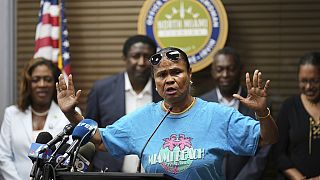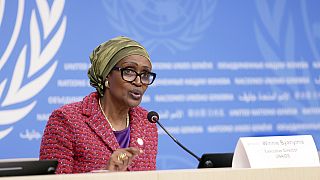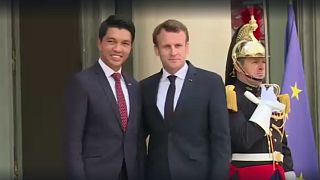France
Civil parties in the case of the jailed former senior Rwandan official Laurent Bucyibaruta have welcomed the ruling by a Paris court after handing him 20 years for complicity in the African nation's genocide.
The parties said this was a relief for the victims of atrocities during the 1994 massacres in which an estimated 800,000 Tutsis and moderate Hutus died in 100 days of mass killings.
"It is a shock... At the same time, he was convicted of complicity in genocide, so I'm not going to beat about the bush. Just a thought for all the victims, for all the survivors we have heard in court these past weeks, who have come to lay down their burden, who have come to lay down their suffering, who have come to tell Mr. Bucyibaruta what they have endured," said Dafroza Gauthier, the co-founder of the Collective of Civil Parties for Rwanda.
The trial involved more than 100 witness statements, including some from survivors from Rwanda, either in person or by video conference.
Bucyibaruta, who has been in France since 1997, has myriad health problems and was allowed to remain under house arrest during the trial to receive treatments.
"The most important thing, in reality, is that the trial took place, that this man who embodied the power in his prefecture was obliged - even if it took 28 years - to come and answer questions, to explain himself in front of the victims, in the presence of the survivors, and to listen to the survivors' accounts," said Simon Foreman, lawyer of the Collective of Civil Parties for Rwanda.
At the heart of the case against the 78-year-old were several "security" meetings, either ordered or attended by Bucyibaruta, which prosecutors had argued were actually planning sessions for the killings.
Specifically, the former prefect of the southern province of Gikongoro was accused of having persuaded thousands of people to take refuge in the Murambi Technical School, by promising them food, water and protection.
Days later, in the early hours of April 21, tens of thousands of Tutsis were executed there in one of the genocide's bloodiest episodes.
The court also examined Bucyibaruta's responsibility in the massacre of around 90 Tutsi pupils at the Marie Merci school in Kibeho on May 7, 1994 and in the execution of Tutsi prisoners -- including three priests -- in Gikongoro prison.
During his trial, Bucyibaruta denied any involvement in the killings.
"I was never on the side of the killers," Bucyibaruta told the court as his trial ended on Tuesday.
In an apparent message to genocide survivors, he said: "I want to tell them that the thought of leaving them to the killers never entered my mind."
He added: "Did I lack courage? Could I have saved them? Those questions, those regrets even, have been haunting me for over 28 years."
His lawyers had called for the court to take "a courageous decision" and acquit him.












01:52
In Goma, solar power brings light and hope in Ndosho neighbourhood
02:13
Congo and Rwanda sign a US-mediated peace deal aimed at ending decades of bloody conflict
00:54
African Human Rights court says it can hear case brought by DRC against Rwanda
01:11
Burundi calls on United Nations to recognize 1972 genocide against Hutus
01:20
Somalia launches Centennial Vision 2060 roadmap for 'peace, prospertity and progress'
01:01
Rwandan opposition leader Ingabire arrested in connection with alleged plot to overthrow president